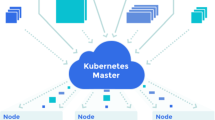Abstract
This paper presents new multi-objectives scheduling strategies implemented in Docker SwarmKit. Docker SwarmKit is a container toolkit for orchestrating distributed systems at any scale. Currently, Docker SwarmKit has one scheduling strategy called Spread. Spread is based only on one objective to select from a set of cloud nodes, one node to execute a container. However, the containers submitted by users to be scheduled in Docker SwarmKit are configured according to multi-objectives criteria, as the number of CPUs and the memory size. To better address the multi-objectives configuration problem of containers, we introduce the concept and the implementation of new multi-objectives scheduling strategies adapted for Cloud Computing environments and implemented in Docker SwarmKit. The principle of our multi-objectives strategies consist to select a node which has a good compromise between multi-objectives criteria to execute a container. The proposed scheduling strategies are based on a combinaison of PROMETHEE and Kung multi-objectives decision algorithms in order to place containers. The implementation in Docker SwarmKit and experiments of our new strategies demonstrate the potential of our approach under different scenarios.
Access this chapter
Tax calculation will be finalised at checkout
Purchases are for personal use only
Similar content being viewed by others
References
Behzadian, M., Kazemzadeh, R., Albadvi, A., Aghdasi, M.: Promethee: a comprehensive literature review on methodologies and applications. Eur. J. Oper. Res. 200(1), 198–215 (2010)
Cáceres, L.P., Pagnozzi, F., Franzin, A., Stützle, T.: Automatic configuration of GCC using irace. In: Lutton, E., Legrand, P., Parrend, P., Monmarché, N., Schoenauer, M. (eds.) EA 2017. LNCS, vol. 10764, pp. 202–216. Springer, Cham (2018). https://doi.org/10.1007/978-3-319-78133-4_15
Cérin, C., Ben-Abdaallah, W., Saad, W., Menouer, T.: A new docker swarm scheduling strategy. In: 7th International Symposium on Cloud and Service Computing, Kanazawa, Japan (2017)
Chang, P.-C., Chen, S.-H.: The development of a sub-population genetic algorithm II (SPGA II) for multi-objective combinatorial problems. Appl. Soft Comput. 9(1), 173–181 (2009)
Choi, S., Myung, R., Choi, H., Chung, K., Gil, J., Yu, H.: GPSF: general-purpose scheduling framework for container based on cloud environment. In: IEEE iThings and IEEE GreenCom and IEEE CPSCom and IEEE SmartData (2016)
Daolio, F., Liefooghe, A., Vérel, S., Aguirre, H.E., Tanaka, K.: Problem features versus algorithm performance on rugged multiobjective combinatorial fitness landscapes. Evol. Comput. 25(4), 555–585 (2017)
Ding, L., Zeng, S., Kang, L.: A fast algorithm on finding the non-dominated set in multi-objective optimization. In: The 2003 Congress on Evolutionary Computation, CEC 2003, vol. 4, pp. 2565–2571, December 2003
Grid5000: https://www.grid5000.fr/
Grillet, A.: Comparaison of containers schedulers. Medium (2016)
Brans, J.-P., Mareschal, B.: Promethee methods - multiple criteria decision analysis: state of the art surveys. International Series in Operations Research & Management Science, vol. 78 (2005)
Jimenez, L.L., Simon, M.G., Schelén, O., Kristiansson, J., Synnes, K., Åhlund, C.: CoMA: resource monitoring of docker containers. In: Proceedings of the 5th International Conference on Cloud Computing and Services Science (CLOSER 2015) (2015)
Knowles, J.D., Corne, D.W.: M-PAES: a memetic algorithm for multiobjective optimization. In: Proceedings of the 2000 Congress on Evolutionary Computation. CEC00 (Cat. No.00TH8512), vol. 1, pp. 325–332 (2000)
Kung, H.T., Luccio, F., Preparata, F.P.: On finding the maxima of a set of vectors. J. ACM 22(4), 469–476 (1975)
Li, K., Fialho, Á., Kwong, S., Zhang, Q.: Adaptive operator selection with bandits for a multiobjective evolutionary algorithm based on decomposition. IEEE Trans. Evol. Comput. 18(1), 114–130 (2014)
Medel, V., Tolón, C., Arronategui, U., Tolosana-Calasanz, R., Bañares, J.Á., Rana, O.F.: Client-side scheduling based on application characterization on Kubernetes. In: Pham, C., Altmann, J., Bañares, J.Á. (eds.) GECON 2017. LNCS, vol. 10537, pp. 162–176. Springer, Cham (2017). https://doi.org/10.1007/978-3-319-68066-8_13
Menouer, T., Cerin, C.: Scheduling and resource management allocation system combined with an economic model. In: The 15th IEEE International Symposium on Parallel and Distributed Processing with Applications (IEEE ISPA 2017) (2017)
Peinl, R., Holzschuher, F., Pfitzer, F.: Docker cluster management for the cloud-survey results and own solution. J. Grid Comput. 14(2), 265–282 (2016)
Deshmukh, S.C.: Preference ranking organization method of enrichment evaluation (PROMETHEE). Int. J. Eng. Sci. Inven. 2, 28–34 (2013)
Taillandier, P., Stinckwich, S.: Using the promethee multi-criteria decision making method to define new exploration strategies for rescue robots. In: International Symposium on Safety, Security, and Rescue Robotics (2011)
Ullman, J.: NP-complete scheduling problems. J. Comput. Syst. Sci. 10(3), 384–393 (1975)
Xing, L.-N., Chen, Y.-W., Yang, K.-W.: Multi-objective flexible job shop schedule: design and evaluation by simulation modeling. Appl. Soft Comput. 9(1), 362–376 (2009)
Zhou, A., Qu, B.-Y., Li, H., Zhao, S.-Z., Suganthan, P.N., Zhang, Q.: Multiobjective evolutionary algorithms: a survey of the state of the art. Swarm Evol. Comput. 1(1), 32–49 (2011)
The apache software foundation. Mesos, apache. http://mesos.apache.org/
Kubernetes scheduler. https://kubernetes.io/
Swarm kit. https://github.com/docker/swarmkit/
Acknowledgments
This work is funded by the French Fonds Unique Ministériel (FUI) Wolphin Project. We thank Grid5000 team for their help to use the testbed.
Author information
Authors and Affiliations
Corresponding author
Editor information
Editors and Affiliations
Rights and permissions
Copyright information
© 2018 Springer Nature Switzerland AG
About this paper
Cite this paper
Menouer, T., Cérin, C., Leclercq, É. (2018). New Multi-objectives Scheduling Strategies in Docker SwarmKit. In: Vaidya, J., Li, J. (eds) Algorithms and Architectures for Parallel Processing. ICA3PP 2018. Lecture Notes in Computer Science(), vol 11336. Springer, Cham. https://doi.org/10.1007/978-3-030-05057-3_8
Download citation
DOI: https://doi.org/10.1007/978-3-030-05057-3_8
Published:
Publisher Name: Springer, Cham
Print ISBN: 978-3-030-05056-6
Online ISBN: 978-3-030-05057-3
eBook Packages: Computer ScienceComputer Science (R0)




